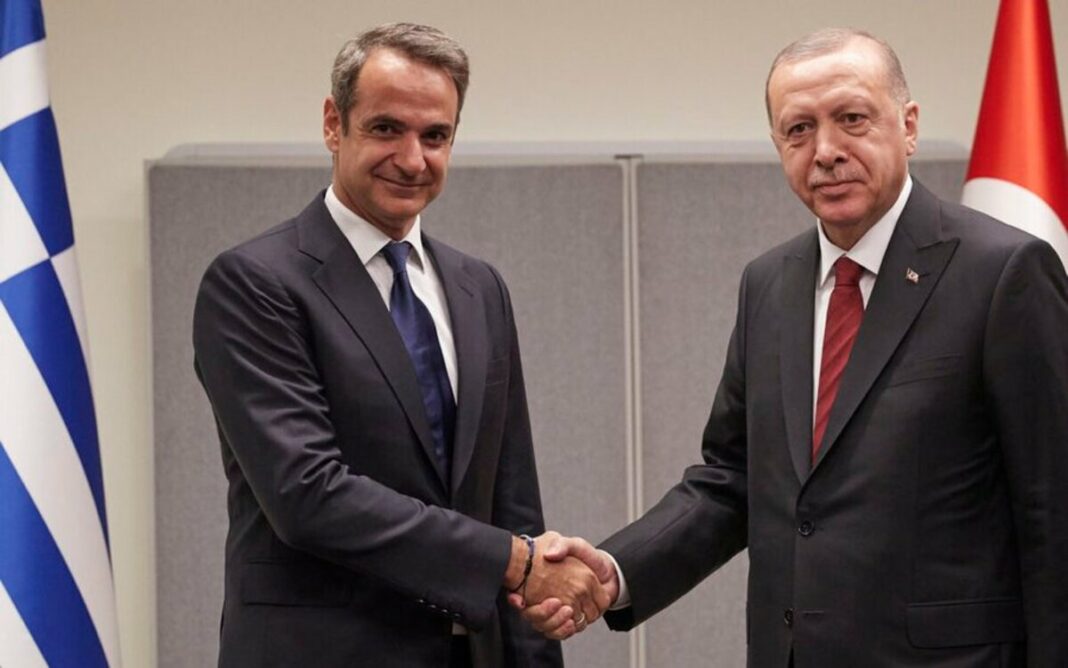In the world of commotion, Greek-Turkish tensions are one of those that will not go away. Although both Athens and Ankara radiate some optimism, the reality is different. On the eve of Mitsotakis’ visit to Ankara on May 13, Erdoğan reopened magnificent ancient church of Chora in Istanbul as a mosque. Pendulum swings between confidence-building and arms wrestling.
Mediapart, May 11, 2024, by Yavuz Baydar
Following the close encounter in Athens early December last year, two leaders of Greece and Turkey, Prime Minister Kyriakos Mitsotakis and President Recep Tayyip Erdoğan, will sit face to face with one another once more, on Monday, May 13, in Ankara. Depending on who you ask, the anticipations are either high, or seen as “business as usual”.
The only tangible output of the December meeting was the so-called “Athens Declaration on Friendly Relations and Good-Neighborliness », and now the eyes are on what to expect next. Hard to predict.
More than anything, this question should be approached with extreme caution:
If the two governments can be seen as having managed a considerable de-escalation of the relations, how far are they from stabilizing it?
In other words, a welcome thaw does not necessarily mean normalisation, especially not in the global climate of poisonous commotion.
On the eve of the meeting, there is, first of all, an assymetry in the conditions of each country. Rather consistent in economic indicators and foreign policy issues, Greece has always been keen on balancing the relations with its eastern neighbour, being re-active rather than pro-active in sensitive territorial issues. It has shown restraint, yet remained edgy.
On the other side, Turkey under Erdoğan had a complicated choreography, domestically and internationally: Profoundly crisis-ridden on several levels, ironically in its centennial, Ankara radiated unpredecitability, because of the intricate nature of the power games taking place in the capital.
One decisive dimension is highlighted recently by Hüseyin Çelik, one of the founding fathers of the ruling AKP, a party heavyweight no longer in Erdoğan’s close circles. Calling the alliance with the ultra-nationalist MHP “a state of frenzy”, he said in an interview with Serbestiyet news site: “The MHP has influence and authority over the government twenty times more than its weight.”
Is Erdoğan in control or, as Çelik implies, a hostage of the hard-liner flanks, as a result of the developments since the attempted coup in 2016? His agenda and deeds in the past eight years strengthens the arguments for the latter. Latest local elections results also put on display, how erratic economic policies and oppressive conduct swept him to a corner, making him lose steam.
However much the losses of the AKP caused optimism in domestic opposition circles and abroad, the paradox should be highlighted: A strongman, who rose to top with the help of abuses and disrespect for the ethical rules, can even be more unpredictable due to his reflexes of political survival. Currently, Ankara is the epicenter of a growing struggle between Erdoğan and what he described as “fractions infiltrating the state apparatus”, meaning mafia circles who have risen as part of the massive corruption.
Local elections may have given a snaphot of grown discontent within the electorate, but even if Erdoğan may have lost its charisma, he sits at the top of the state apparatus, surrounded by —as Çelik makes clear— the old guard of nationalists and ant-west circles; and oversees a Parliament dominated by offensive nationalism, including the main opposition CHP Party, whose new leader pledges unity with the AKP-MHP axis in foreign policy issues.
These ground differences will overshadow the meeting in Ankara. No wonder why the reopening the magnificent monument in Istanbul, Chora, on May 6, as a mosque, came as a cold shower in Athens. As a gesture Erdoğan could have postponed the opening, but didn’t. Mitsotakis refused to postpone his visit, despite hard domestic pressure. Mitsotakis criticized the move as provocative and pledged to request its reversal from the Turkish president.
“We can collaborate with Turkey despite the challenges,” he said in an interview with Alpha TV. « While not all issues will be resolved overnight, it’s better to talk than to constantly have our finger on the trigger.” These words reveal how tense the Greek side is, given the political conjuncture of its eastern neighbour, whose campaigns of militarisation and investments in arms production which has led to a upward spiral of armament in the past 5-6 years.
Given the delicate constellation in Ankara, not much should be expected on Cyprus. Neither on the dispute in the Aegean. Mitsotakis seems aware that the stakes should be kept low in any issue, knowing that his anxious counterpart remains unpredictable. Cancellation of Erdoğan’s visit to Washington, and blockage of trade with Israel are harbingers of harder times.
Tourism and refugees can be issues open to flexibility and add to the fragile “positive agenda” — a term otherwise far too rosy, given the world conjuncture.
The Greek intentions of opening a marine park in the Aegean, however, can be a non-starter for de-escalation. The move has already been met by eyebrows in the international law and environmental circles, as not-so-well thought out. Athens may not be willing to endanger a quiet summer for its lucrative tourism.
Speaking of confidence building measures, on the other hand, one issue — related with energy — remains unexplored.
There are about 5 thousand islets and large rocks in the Aegean. Many of them are causes of the notorious territorial dispute between the two countries. Yet, they carry a potential for a positive agenda, if the two sides can be more creative than they are.
The need for alternative energy sources could be preferable to the drillings for fossile fuel at the depths, leading to tug of war. Instead, Athens could investigate and argue for establishing wind crafts on those uninhabitable spots, and offer a portion of energy for free to the Turkish side.
A win-win step, serving the spirit of friendly relations and good neighbourliness?
Food for thought, at least.

